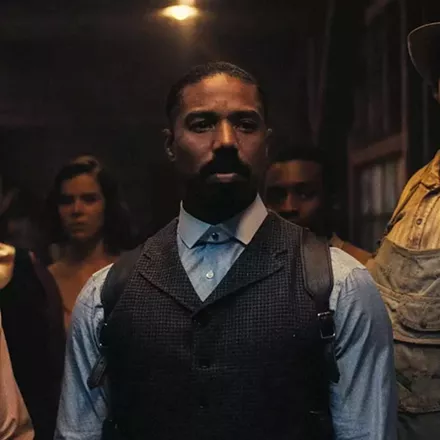Best of Sundance 2023
All Dirt Roads Taste of Salt, Passages and Victim/Suspect lead the festival.
By Scott Renshaw @scottrenshawAll Dirt Roads Taste of Salt
[U.S. Dramatic]
If Sundance is about nothing else, it's about the opportunity to discover singular artistic voices, and that's what writer/director Raven Jackson proves to be in this journey of family and memory. Though it opens in what appears to be late 1960s/early 1970s Mississippi—following a young girl named Mack (Kaylee Nicole Johnson)—the narrative bounces around in its chronology, occasionally revisiting the childhood of Mack and her younger sister Josie (Jayah Henry) as well as the lives of the adult Mack (Charleen McClure) and Josie (Moses Ingram). It's inaccurate to say that "nothing happens" in All Roads Taste of Salt—there are a couple of crucial events, including a tragic death—but Jackson is far less concerned with following a plot than with evoking a feeling, a sense of a particular place and how the connections of the natural world can be as potent as the connections of family. She and cinematographer Jomo Fray capture that notion through a powerful sense of tactility, observing as Mack absorbs the memory of things—the scales on a fish, the smooth hardness of her mother's painted toenails, a muddy river bottom—through her fingers. And they show a remarkable sense for where to point the camera, like a reunion between Mack and her first love, Wood (Reginald Helms, Jr.) where their embrace is shot initially not with the emphasis on their faces, but on the wedding band on Wood's finger. It's a risky choice to present a scene like that before we've seen the relationship it follows, but it's evidence of Raven Jackson's gifts that so much emotion is conveyed not as an accumulation of what we've seen, but through what we're seeing, hearing and feeling at any given moment.
Passages
[Premieres]
In hindsight, there's something pitch-perfect about the fact that the movie Tomas (Franz Rogowski), the filmmaker anti-hero of co-writer/director Ira Sachs' feature, is making at the outset is titled Passages, produced (like this movie) by SBS Productions; if nothing else, it's a portrait of a kind of solipsism whereby you just assume everything must be all about your needs. The premise finds Thomas beginning an affair with a woman named Agathe (Adèle Exarchopoulos)—one that he has no problem immediately telling his husband of 15 years, Martin (Ben Whishaw), took place. While this is a sort of romantic triangle that eventually becomes a romantic square, it's one where Sachs and his regular co-writing partner Mauricio Zacharias make it clear that one side is always out of balance with the others. Their script and Rogowski's performance magnificently evoke a certain kind of narcissistic artist so convinced that they feel things more deeply than the rest of the world that the feelings of the other people in their lives almost don't exist. And Sachs' complements this singular character study with unconventional filmmaking choices, like cutting from an awkward bedtime silence between Tomas and Martin not to pretending everything is normal the next day, but to the middle of the fight that clearly immediately ensued. Passages is stunning in its simplicity, letting Tomas wreck his own life through the fundamental inability to see those he claims to love as anything but supporting characters in a movie where he's the hero.
Victim/Suspect
[U.S. Documentary]
Sometimes you can't separate how angry a movie makes you feel from whether it's a great piece of filmmaking—and maybe, in some cases, that's okay. The fury that emerges is profound as director Nancy Schwartzman follows the work of Rae de Leon, a reporter for California-based Center for Investigative Reporting, as she digs into nationwide examples of women who have reported sexual assault to police being accused of—and arrested for—making false statements. Schwartzman and de Leon are meticulous in chronicling the police behavior responsible for these "flipped" cases, as they make use of video interviews that show investigators lying to these women about evidence proving that they're liars, while further exposing how this is kind of just standard practice in order to make a case go away. They also wisely focus on a few individual cases, and the victims whose lives were devastated not once but twice, letting them tell their stories and confront the reality of how they were manipulated. It's a debatable choice to make de Leon the hero of the story, giving as much focus to the process of exposing these actions as to the actions themselves. Then again, maybe it's important to emphasize that the investigative legwork done by journalists on this subject should have been done by law enforcement, to emphasize that it's not that they couldn't have made this same effort, but they were simply too lazy and callous to do it.
More by Scott Renshaw
-
Comedian Steve Hofstetter interview
On his comedy origins, dealing with hecklers, and how a Utah appearance helped define his on-stage sensibility
- Apr 23, 2025
-
Film review: THE ACCOUNTANT 2
Follow-up to the 2016 Ben Affleck action drama embraces the weird, for better or worse.
- Apr 23, 2025
-
Film Reviews: New Releases for April 18
Sinners, The Wedding Banquet, Sneaks, The Ugly Stepsister, One to One: John & Yoko
- Apr 17, 2025
- More »
Latest in Film Reviews
Readers also liked…
-
Sundance 2025 wrap-up plus February special screenings
Uncertainty about the future location shifts focus away from the movies
- Feb 5, 2025












